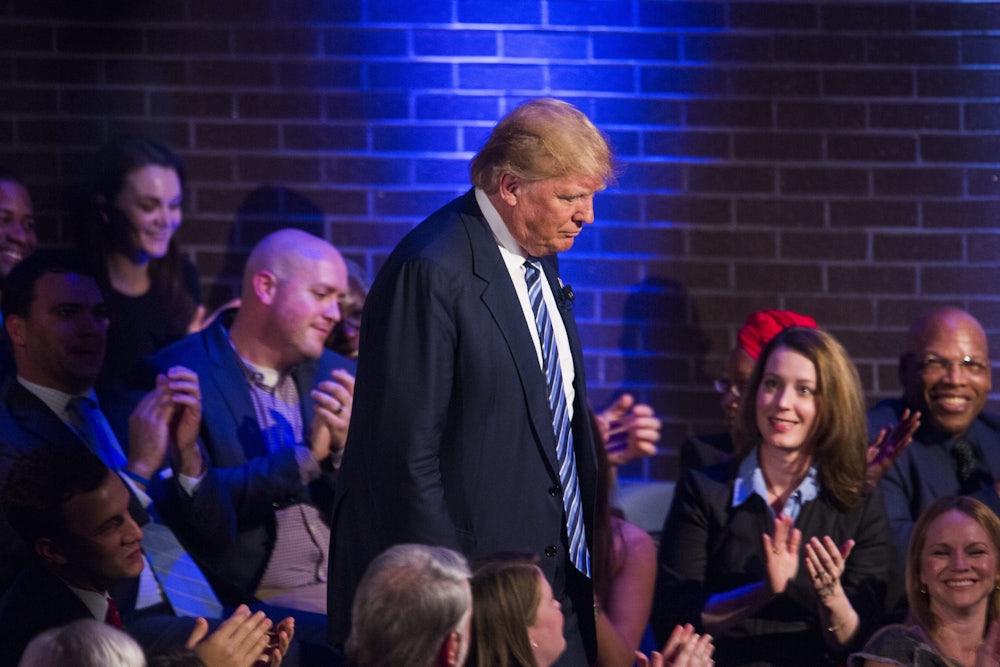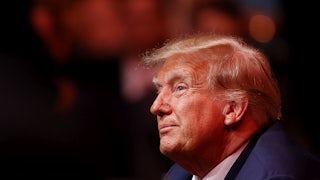Town hall meetings evoke, at least in our country’s inherited memory, flinty New Englanders coming together to debate local issues—and for good reason. The first town hall was held in Dorchester, Massachusetts, in 1633, and they soon became a common feature of towns throughout the Northeast. When Norman Rockwell, then living in Vermont, illustrated “freedom of speech” in the middle of World War II, he depicted a man in a flannel shirt and a leather jacket standing up to speak at a town hall.
But in the hands of CNN, the words “town hall” take on an opposite meaning. The made-for-television version last week gave Donald Trump a claque of supporters in the audience who cheered his outrageous lies and laughed at his unrepentant attacks on E. Jean Carroll—and never booed, per CNN’s wishes. The network’s moderator, rising star Kaitlan Collins, was not only outmatched by a ranting Trump but outnumbered by the raucous crowd. On stage, with her desperate fact-checks, she seemed as beleaguered as an umpire throwing Aaron Judge out of a ball game at Yankee Stadium in the heat of a pennant race.
Television has the power to bring presidential candidates into your living room. But there is no journalistic reason to assemble a studio audience for a candidate interview or a debate. The four John Kennedy–Richard Nixon debates in 1960 lost none of their history-making importance and high drama because they took place in nearly empty television studios rather than in auditoriums jammed with VIP crowds.
But these days, TV production values matter more than serious content, even when Trump isn’t dominating the stage. A cheering audience creates a level of ersatz excitement, whether it is for a prime-time, ratings-boosting CNN interview or a lowbrow, desperately cheerful syndicated quiz show. It is why all the 2016 and 2020 primary debates in both parties were tricked out with space-age sets and impossible-to-silence audiences.
But in an era of accelerating hyperpartisanship and vicious attacks on the news media, allowing a peanut gallery at such events only indulges our worst tribal instincts. That’s why the networks—broadcast and cable alike—should conduct their candidate interviews and debates in TV studios rather than trucking in disruptive crowds.
Maybe the underlying problem is with the town meeting format itself. The questioners were all Republicans and independents who plan to vote in the 2024 GOP primary in New Hampshire. They were not chosen at random. “CNN handled all the selecting of audience members and audience questions,” The Boston Globe reported. That was apparent from the way Collins called on them by name, as if they were contestants on a game show: “Jennifer Simpson … is a stay-at-home mom and a former town selectman from Windham.” And it was CNN’s decision that none of the questioners came from the ranks of never-Trump Republicans and independents who can easily be found among New Hampshire voters.
The question topics were all predictable: immigration, abortion, Ukraine, and the debt ceiling. There were no spontaneous moments that often occur when candidates answer actual voter questions in early states like Iowa and New Hampshire. In contrast, nothing at the CNN town hall was random aside from Trump’s rants.
Campaign reporters and television interviewers have long been faulted by press critics for obsessively asking candidates about the latest polls and minor recent news events. There is a high-minded belief structure that ordinary citizens ask far better questions because they are concerned with issues rather than the horse race. The problem with overly lionizing the voice of the common voter is that average citizens often ask questions in open-ended fashion like, “What are your views on education?” Such free-range questions have the downside of letting candidates simply launch word for word into the education section of their stump speeches. Journalists may err in stressing topics that will not survive a single news cycle, but they are adept at framing questions in a way that make it hard for candidates to easily go on autopilot.
President Jimmy Carter embraced town halls as an informal way to communicate with voters, beginning with an appearance in Clinton, Massachusetts, in March 1977. As a Carter speechwriter, I recall that an opening statement would be written for the president, but after that he pretty much winged it like at a press conference. Bill Clinton loved town meetings since they allowed him to exploit his uncanny ability to project empathy. In the fall of 1992, negotiators for Clinton insisted that a town meeting format be employed for one of his three debates with George H.W. Bush and Ross Perot. And Bush immediately fell into the trap when a voter asked the candidates an ill-phrased question, “How has the national debt personally affected all your lives?” Bush struggled to find a personal connection to an abstract concept like the national debt—and was later ridiculed for being out of touch with the concerns of economically hard-pressed voters.
When the 2024 campaign gets into its later stages, there is value in watching how candidates for president respond to citizen questions. But the way to handle that journalistically is to report on campaign events where the candidate takes unvetted questions from voters. CNN’s error—beyond bequeathing TV time to an indicted former president in the first place—was in trying to engineer every single moment of last week’s town meeting to maximize ratings. As a result, it came across to TV viewers as the equivalent of a Trump rally minus the MAGA signs and the hard-rock soundtrack. It was, as Trump might say, rigged.






